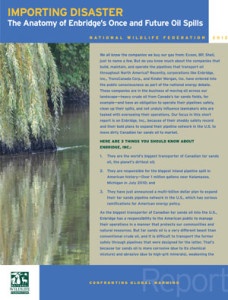We have much more to do and your continued support is needed now more than ever.
Weekly News Roundup – July 27, 2012
Want to know what National Wildlife Federation was up to this week? Here is a recap of the week’s NWF news:
NWF Applauds New Solar Energy Plan
July 24 – The Department of the Interior’s Bureau of Land Management released the final solar programmatic environmental impact statement, which outlines the future of utility-scale solar energy development on public lands and makes responsible solar energy projects part of our national energy policy.
The National Wildlife Federation applauds the BLM and partner agencies who oversaw a four-year development process driven by significant stakeholder input. The landscape-level management approach of the final solar energy program is vastly improved from earlier drafts, with sportsmen playing a particularly key role in identifying and encouraging needed changes in the plan. A key component of the solar energy program is the establishment of an initial set of 17 “solar energy zones” encompassing 285,000 acres covering six Western states.
217 Atlantic Coast Environmental Groups and Other Stakeholders Unite Behind Atlantic Offshore Wind
July 24 – Today, 217 environmentalists, conservationists, clean energy advocates, businesses, and local and state officials from up and down the Atlantic Coast are united in calling for bold action to accelerate the development of offshore wind. The coalition released a letter to the Obama Administration to show strong support for progress made to date and to urge continued leadership to ensure we see several wind farms spinning off our coasts within the next few years.
New Report Details Enbridge’s Costly Failures
July 23 – As demonstrators prepare a national remembrance of the Kalamazoo River tar sands spill tragedy, and the National Academy of Sciences hears testimony on the dangers of tar sands oil, National Wildlife Federation has issued a report examining the practices of the company behind the spill, Enbridge, Inc. The report details Enbridge’s steady history of large spills in the U.S. and Canada, reckless expansion plans that would lead to more spills, and unseemly marketing tactics used to defuse criticism. The report makes seven recommendations to prevent further tragedies.
While Enbridge recently received a record fine and a scathing condemnation from U.S. agencies for the massive oil spill of two years ago, the NWF report makes clear that the Kalamazoo disaster is but one in a series of spills, and that more will occur due to an inadequate regulatory system.
And here are highlights from NWF in the News:
- Detroit Free Press: Report slams Enbridge Energy’s history of oil spills
- CBS News: Group criticizes Enbridge’s safety record
- Chicago Parent: Wildlife take the gold for true Olympic feats
- Fredericksburg Free Lance Star: Fossil fuels create pollution and global warming (OpEd)
- UPI: Groups get in line behind U.S. wind energy
- The Daily Democrat: Solar power stations put on the fast track
For more, visit www.nwf.org/News






















